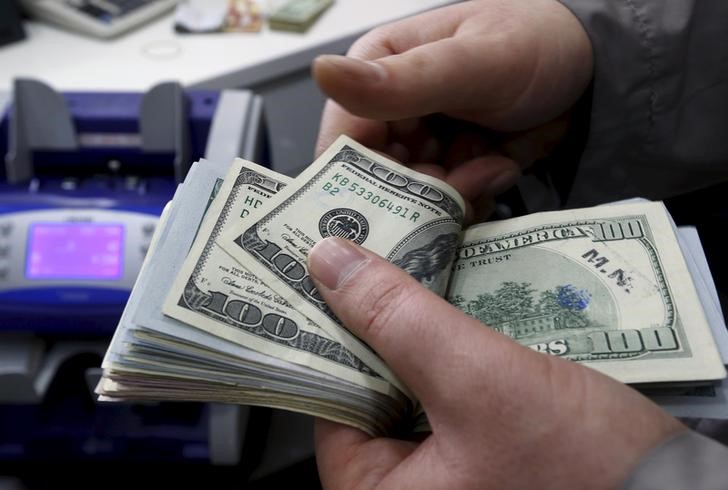By Nigel Stephenson
LONDON (Reuters) - The dollar fell on Tuesday to its weakest against the yen since October 2014 as investors' view of riskier assets soured, pushing shares and oil prices lower as the outlook for U.S. interest rates remained clouded.
The Japanese currency, often sought in times of market turmoil or economic uncertainty, fell as low as 110.30 per dollar as the Asian trading day ended with losses in many stock markets. European shares also fell in early deals.
Crude oil, which had fallen in recent days on fading prospects of agreement among producers to curb oversupply, took another hit from data showing U.S. demand for gasoline fell in January for the first time in 14 months.
Further muddying the waters for investors, two senior officials of the U.S. Federal Reserve said the market's views of when the central bank would raise interest rates may be too pessimistic.
Just a week ago, Fed Chair Janet Yellen said the Fed would process cautiously in raising rates -- remarks viewed as dovish and which drove U.S. stocks to 2016 highs.
The dollar fell 0.8 percent against the yen and last traded at 110.40 yen. The euro fell 0.3 percent to $1.1364.
"Clearly risk sentiment is not good and oil prices are declining this week and ...feeding and driving the dollar lower against the yen," said Yujiro Goto, currency strategist at Nomura in London.
The Australian dollar fell with commodity prices and was down 0.5 percent to $0.7563, having risen after the Reserve Bank of Australia left interest rates unchanged, as widely expected.
In stock markets, the FTSEurofirst 300 share index dropped 1.5 percent. Germany's DAX index slid 2.2 percent after data showed German industrial orders unexpectedly fell 2.1 percent in February due to weak foreign demand, especially from euro zone countries.
MSCI's broadest index of Asia-Pacific shares outside Japan was earlier down 1.3 percent. Japan's Nikkei index fell 2.4 percent to an eight-week closing low, as the yen rallied, hurting exporters.
Australia's S&P/ASX 200 index fell 1.4 percent.
Chinese shares bucked the trend, closing up 1.3 to 1.4 percent as trading resumed after a market holiday.
Oil prices, which have fallen from above $100 a barrel since mid-2014 on a global supply glut to a trough of $27.10 in late January, fell again on the signs of subdued U.S. demand.
The U.S. Energy Information Administration said on Monday that gasoline demand fell 0.6 percent in January. Total U.S. oil demand fell 1 percent compared with January 2015.
Brent crude, the international benchmark, traded 30 cents lower at $37.39 a barrel, down from a 2016 high of $42.54 touched in mid-March.
LOW-RISK
As stock prices tumbled, yields on low-risk government bonds fell. German 10-year Bund yields, the benchmark for euro zone borrowing costs, fell as far as 0.92 percent, their lowest in almost a year.
"The data signals weaker export growth, softer demand both within the euro zone and abroad and thus suggesting that the ECB's challenge as regards boosting inflation and inflation expectations is and will remain very much an uphill battle," Rabobank strategist Matt Cairns said.
U.S. 10-year Treasury yields fell nearly 5 basis points to 1.731 percent, their lowest since March 1.
Gold, another perceived safe haven and a top-performing asset in the first three months of 2016, rose more than 1 percent, reversing losses of 1.4 percent chalked up in the last two days. It traded at $1,228.40 an ounce.

Copper was having a better day after falling for the last seven, gaining 0.3 percent to $4,774.50 a tonne.